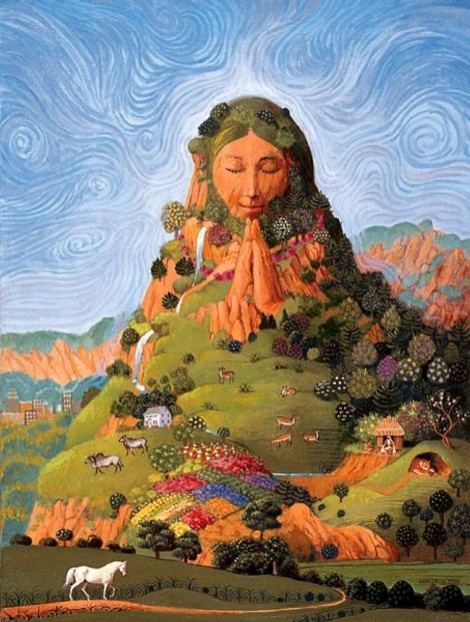
It has been clear for a long while now that modern environmentalism is a cult. Now, some are outright calling for Earth Day to be a religious holiday.
“So, what would an earth-reverent belief system look like with Earth Day at its center?
“To begin with, let’s take a look at what established religions get right and where we might take a cue. Perhaps the first step might be, um, unearthing the nature-centered origins of our existing religious holidays. Most of us know in the back of our minds that Christmas and Hanukkah fall around the time of the winter solstice; that Easter and Passover are celebrated in tandem with the arrival of spring; that Sukkot and Diwali mark harvest and summer’s last warmth, and Eid follows the path of the moon. These holidays have origins in gratitude. Gratitude for the sun returning. Gratitude for the harvest that could avert the starvation winter might bring. Thanks for when it did avert it. We could conceivably reframe these holidays as days of thanks for what the natural world gives and reminders that our responsibility for what remains is an ongoing covenant.
“Next, we might look at what religions do to help us form community and mark life’s important benchmarks: birth, maturity, marriage, and death. What if we were to come to celebrate these benchmarks for what they are biologically? Birth, that ecstatic co-joining of atoms and molecules resulting in sentience might prompt a ritual of truthfully and factually recounting how inanimate becomes animate. Instead of (or in addition to) bar/bat mitzvahs and confirmations, would it be too much to expect our children to go beyond the average daily 20 minutes most American children spend outdoors, and commit to memory the names and descriptions of local plants and animals, or learn the considerations involved in correctly planting a tree? The covenant of marriage might be an opportunity to remind young couples to consider the burden children place upon the planet and to make vows of sustainable patterns of behavior going forward. Death, finally, might be recognized for what it is—a returning of atoms and molecules to the cycle. In the cycle of life, the coming apart is as miraculous a process as the joining. We still don’t really know how nothing became something and formed a universe in which random pulses of energy and matter coalesced into beings writing op eds. In short, there’s plenty of mystery to go around.
“Lastly, we might just need a book. The Jewish Torah wraps around the year nicely from one Simchat Torah to the next, when we complete the annual reading of the story and start over again all in the same service, creating the feeling of a hermetic year. What if a book like that existed for the Earth? What if it were replete with hymns to this world of the living? What if it contained the stories of the prophets of natural earth knowledge—Darwin and Carson, Galileo and Humboldt? What if we came to mark those discoveries as the gradual opening of consciousness to the laws of nature. What if our Bible of the Natural World reenforced that a multiplicity of processes and phenomena still remain to be discovered? What if we used that book not to scold our children into following commandments but rather to light a path forward that encouraged discovery and reverence, and gratitude for the relationships that are this planetary spaceship’s life-support?
“Are we proposing a whole new religion? We’re not quite sure. Maybe an old one. […]
“In short, we must make nature central to our belief system with Earth Day or any number of earth-focused ceremonial days serving as regular reminders of what we owe our home planet.”
Humans tend to be religious creatures by nature. In order to create a new world order, the current religions must be supplanted with one focused on the here and now where salvation can be found by obeying the dictates of the eco-priests, self-denial of possessions, and taking the bugs as if they were communion wafers.
And woe be to the unbelievers…







Pingback: In The Mailbox: 05.02.23 : The Other McCain
Only a cult the last 59 years.